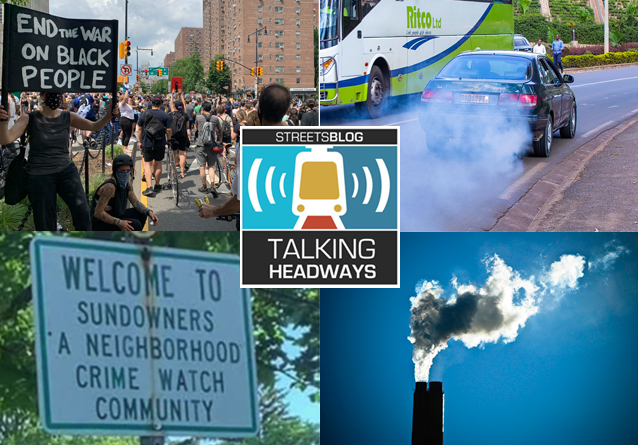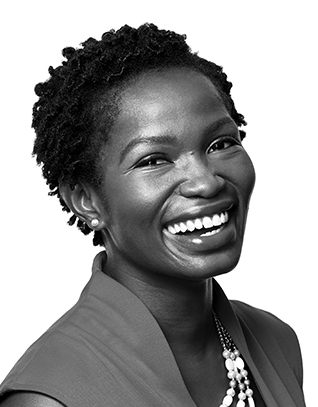This week on the podcast, we are chatting with Stephanie Gidigbi, director of policy and partnerships for the Natural Resources Defense Council. Gidigbi talks about federal policy, connections between transportation and race, the importance of performance measures, and much more!
For those of you who prefer to listen than to read, there's an edited transcript below. If you want the full transcript (with typos!), click here.
Jeff Wood: I'm wondering if there's something in that, you know, house bill that you really liked or that you really focused on that was different than say previous bills.
Stephanie Gidigbi: I mean so many different things. I think one big piece that we thought really hard on his really making sure that we could measure what matters and really start to establish some standards. So being able to establish a new greenhouse gas performance measure, and this isn't unique we had in the previous bill call the FAST Act, there were other performance measures. But I think really thinking through how we also measure the impact of climate change definitely needs to be part of that discussion. And particularly because transportation is the dirtiest sector at this point in terms of air pollution in communities.
And from an equity perspective, it speaks to the higher asthma rates that we may see. And just from an environmental justice perspective, being able to ensure that, especially during this time of COVID, the compounding effects and the cumulative impacts of bad air impacting lives was a big piece. It was really great to see overall the critical investment in focusing, not just on climate change, but also if there were a lot of different pieces that were really even calling out environmental justice goals around cleaner ports, making sure that we are really thinking about the expansion of zero emission vehicles as part of that.
And then there were a lot of studies from an equity perspective of just even simple pieces in terms of who's been stopped for safety violations. And what does that look like? And during this time of racial reckoning, where we are seeing the impacts of both of our policies and sector policies and practices, there's a real opportunity for us to all examine ourselves. And I think transportation is not unique to that. So seeing a lot of those pieces and the invest in America act was definitely encouraging and things that we had been pushing for our, for some time.
Jeff Wood: You mentioned traffic stops and enforcement. I'm wondering why do we have police doing those things now? It seems a little bit overwhelming over the last month to see what's been happening and then not quite understand why things aren't changing.
Stephanie Gidigbi: It's really interesting. One of the things that I also say that I had the opportunity to be as a cultural bearer and I practice the art of remembering. So a lot of the things that I focus and study and read is really on history and it comes from a Ghanian term in Akan, which says "san coca," which means to return to do a look back to move forward. And when we think about just the over-policing of spaces, a lot of it comes from foundational clauses in our constitution and the notion of being able to have the right to move and who has the right to move and what that means.
So Black codes, when slavery was a practice in the United States, being a criminalization of where and how Black people were able to move. And the notion of being able to have the right to stop someone who seemed like they didn't belong — and that never changed. And we still see that notion of that third-party policing emerging in places like we saw in the summer with a young Black men from Georgia – the ways in which we continue to see it, even in the New York park situation that played itself out as well.
And even just the thought process of sundown towns. I mean, every state in America had a sundown town that essentially had some sort of distinct discriminatory policy that said that no Black resident should be caught alive in that town [after] sundown and so and these sundown towns where we are not talking about 1800s, we are talking about 1960s. So that's literally our parents are maybe our grandparents right? And so when you think about that, being the legacy of what we are building from, and then seeing now the notion of how people are able to move and defining Black movement in terms of the over-policing of space, you can understand a little bit more from the historical standpoint of where we've come from as to why it feels acceptable. As to who, who gets to decide, who belongs where, it's pretty concerning.
So I think it's important for us to really understand some of those inherent pieces where we feel we have the right to determine how and who can move — and where.
Jeff Wood: You also had a piece recently in Politico talking about the history of transportation decisions and how they've worsened the racial divide. I'm curious how you connect those dots to state and federal policy in a way that equity discussions and the action with them aren't so siloed as they've been in the past.
Stephanie Gidigbi: It's so interesting because when we think about the legacy of racism and exclusionary practices, even right now, many folks kind of look at the police, but the reality is the notion of separate but equal and segregation began on a railcar with the legacy around Plessy v. Ferguson, which was a landmark case that essentially said that rail cars had the right to be separate and equal. And that would then lead to two generations until we got to the Civil Rights movement of the notion of separate but equal practices. And fast forwarding to the Montgomery boycotts, and Rosa Parks, who chose not to get up from the bus. But that was an intentional action of really wanting to change the public transportation system in Montgomery, Alabama. And, you know, it's interesting because I think sometimes when we tell this story, we don't speak to the resilience that was birthed from those experiences. So, for example, what came out of what was the boycotts for that year was also what I often refer to as some of the first ride shares that we see play out.
So as part of the boycotts — and actually there's a really great book that just got released this year and called Driving While Black, Gretchen Sorin, where talks about just the purchases of small fleets and station wagons that help to transport and to allow folks to organize via carpools, to navigate the city during the boycotts. At first the boycotts were just simply saying, "Hey, just treat us just well. We're paying for a service, or can we at least have the right to be able to be treated like everyone else?" And when they said, "No," that was where folks were like, "Okay, at a basic level, at a basic human level, you can't see me as human. I'm not sure that we're going to really be able to move past anything else."
And, you know, I think sometimes when we have this conversation, we say that we've evolved from equality to equity, but at its core it’s just saying, well, "Could you just see me as human?" Right. And I think even as we've been having these conversations around the Black Lives Matter movement is really just saying like that I am a human being who has a life and that it is worthy, to be acknowledged and treated as such. And when you fast forward to even now, the separate but equal clause has been taken out, but we still see that notion of things being separate, but still unequal in a lot of the ways that we think about just funding prioritization: highways vs. public transit on what that looks like in terms of state transportation dollars that are made available; bus vs. rail on the transit side of things; neighborhoods where sidewalks are actually not allowed because you actively don't want people in your neighborhood; the over-policing of spaces. So it’s really interesting because when you really think about the laws and the practices that have shaped our nation, a lot of it has revolved around transportation.
I, you know, I'll add a couple of pieces because I think as a Black woman, a lot of my learnings and focus is on Black people, but I would say that, you know, the challenges that we saw in the early parts of the formation of our country, wasn't just, you know, a Black experience. We saw it even with indigenous folks and the trans-continental roadways and railways that were built during that time. So I want to come back to that piece because I think it's easy to just think of it as black and white. And I think that's because that's where a lot of our foundation has come from, but you see that same notion and the connection to transportation and the movement of people and where they're able to go to freely as something that is still a problem today. So we definitely have work to do.







